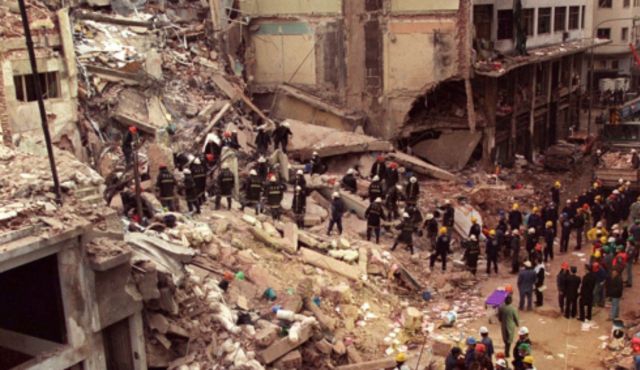Wednesday 31 October 2012 - 14:52
Story Code : 9187
Israel warns Argentina against reaching deal with Iran over 1994 bombing
Senior Argentinian and Iranian officials meet to discuss the attack on a Jewish center which killed 85; Jerusalem tells Buenos Aires it won't tolerate any agreement that does not include the extradition of suspects and compensation of victims' families.
The Foreign Ministry has sent a senior delegation to Argentina to clarify that Israel will respond harshly to any attempt to reach a deal with Iran over the 1994 bombing of the Jewish Community Center in Buenos Aires, which will not include the extradition of Iranian suspects and the compensation of the victims' families.
A senior source in the ministry said that the delegation landed in Buenos Aires last week, ahead of talks held in Geneva between senior Iranian and Argentinian officials on Monday. Argentina's Foreign Ministry said that the purpose of the talks is to discuss the 1994 bombing which killed 85 people and wounded 300, most of them Jews.
The attack was carried out by terrorists of Lebanese origin, who blew up a car loaded with explosives near the building. After over a decade of whitewashing, Argentina's chief prosecutor Alberto Nisman, who headed the inquiry, announced that Iran and Hezbollah were behind it.
The Foreign Ministry's Deputy Director for Latin America Itzhak Shoham and Deputy Director of Intelligence Reuven Ezer met in Buenos Aires with Argentina's undersecretary for Latin America and with the director of Middle East affairs. A request to schedule a meeting with Foreign Minister Hector Timerman, submitted by the Israeli embassy in the Argentinian capital, was denied.
The Israeli officials relayed a sharp message concerning the talks with Iran, highlighting that Israel will not agree to a deal between Iran and Argentina on the expense of the victims. The Israeli diplomats demanded that Argentina insist on the extradition of Iranian suspects and payment of compensation to the victims' families. The Israelis warned that the talks might be used by Iran to bring the investigation to a dead end.
"We're not naive and we told the Argentinians that we will be on alert, and not allow the issue to fade," a senior source in the Foreign Ministry told Haaretz. "We recommended they be very careful vis-a-vis the Iranians, since they might find themselves giving much, but receiving nothing in return."
Argentinian Foreign Ministry officials clarified that the victims were Argentinian citizens entitled to justice, and therefore there would be no giving in to Iranian demands. Minister Timerman relayed a similar message to his Israeli counterpart in a phone call last week with Avigdor Lieberman.
Deputy Foreign Minister Eduardo Zuaim, the Finance Ministry's chief prosecutor and the Foreign Ministry's legal adviser were sent to the talks on Monday at the UN Office in Geneva. Israel expects to receive full details of the talks�from Argentina, a source in the Foreign Ministry said.
For a decade, especially during the reign of President Carlos Menem, Argentina refrained from holding a serious, comprehensive investigation of the attack. Menem's successor, Nestor Kirchner, directed Nisman to renew the inquiry. In his 2006 report, Nisman determined that the bombing was carried out by Hezbollah, which was assisted and directed by the most senior ranks of the Iranian regime.
Senior current and former Iranian leaders were allegedly involved in the ordering of the attack, Nisman said, naming Iran's Supreme Leader Ali Khamenei, President Akbar Hashemi Rafsanjani, Intelligence Minister Ali Fallahian and the head of Revolutionary Guard Mohsen Rezae.
The report went on to determine the involvement of �Hezbollah's chief of staff Imad Mughniyeh, Iranian Ambassador in Argentina Hadi Soleimanpour, cultural attache at the embassy Mohsen Rabbani � who actually served as the operation officer of the attack � and Ahmad Reza Asghari, a diplomat at the Iranian embassy who was in fact an intelligence officer.
Upon the request of the Argentinian government, Interpol issued international arrest warrants in 2007�against several senior Iranian officials, including Fallahian, Rezae, Rabbani and Asghari, as well as Ahmad Vahidi, Iran's current defense minister.
Iran has repeatedly denied any connection to the attack and has refused to extradite the suspects. The Islamic Republic argued that Nisman's report was based on false information supplied to Argentina by the U.S. and Israel.
In March 2011, Argentinian newspaper Perfil reported that Timerman had offered Iran a deal, according to which Argentina would 'forget' the attack on the Jewish center and freeze the inquiry in return for upgrading relations and trade ties between the two countries. The report said that Timerman offered that Syrian President Bashar Assad be used as a mediator between the sides.
Timerman avoided unequivocally denying the report. Even during his visit to Israel last April, he didn't take advantage of the joint press conference with Foreign Minister Lieberman in order to refute the report. On his part, at the press conference Lieberman said that the issue was clarified. However, several months later in July 2011, Iran announced that it would be willing to open talks with Argentina in effort to solve the "misunderstandings" concerning this affair.
During last month's UN General Assembly, Timerman met with Iran's Foreign Minister Ali Akbar Salehi. The two officials�decided to open negotiations over the attack. Meeting Lieberman later on, Timerman promised that his country 'would not be fooled' by the Iranians and that Argentina would continue to demand the extradition of the suspected officials.
The Iran Project is not responsible for the content of quoted articles.
# Tags











